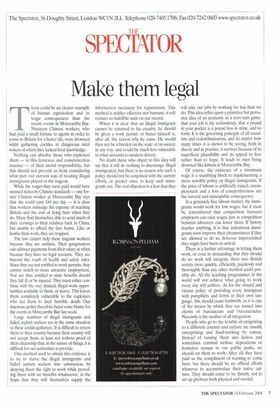Make them legal
There could be no clearer example of human exploitation and its tragic consequences than the recent events in Morecambe Bay.
Nineteen Chinese workers, who had paid a small fortune to agents in order to come to Britain for a better life, were drowned while gathering cockles in dangerous tidal waters of which they lacked local knowledge.
Nothing can absolve those who exploited them — in this ferocious and conscienceless manner — of their moral responsibility, but this should not prevent us from considering what part our current way of treating illegal immigrants played in the tragedy.
While the wages they were paid would have seemed riches by Chinese standards — one former Chinese worker at Morecambe Bay says that she could earn £44 per day — it is clear that workers misjudge the expense of reaching Britain and the cost of living here when they do. Many find themselves able to send much of their earnings to their relatives back in China, but unable to afford the fare home. Like or loathe their work, they are trapped.
The law cannot help these migrant workers because they are outlaws. Their gangmasters can subtract payments from their salary at whim because they have no legal recourse. They are beyond the reach of health and safety rules. Since they are not entitled to work permits, they cannot switch to more attractive employment. Nor are they entitled to state benefits should they fall ill or be injured. They must either continue with the very limited, illegal work opportunities available to them, or starve. This leaves them completely vulnerable to the exploiters who led them to their horrible death. Our insensate policy therefore bears some blame for the events in Morecambe Bay last week.
Large numbers of illegal immigrants and failed asylum seekers are in the same situation as these cockle-gatherers. It is difficult to return them to their country because their country will not accept them, at least not without proof of their citizenship that, in the nature of things, it is difficult for our authorities to provide.
One method used to obtain this evidence is to try to starve the illegal immigrants and failed asylum seekers into submission, by denying them the right to work while providing them with no benefits whatsoever, in the hope that they will themselves supply the information necessary for repatriation. This method is neither effective nor humane; it will remain an indelible stain on our record.
When it is clear that an illegal immigrant cannot be returned to his country, he should be given a work permit: to better himself is, after all, the reason why he came. He would then not be a burden on the state or on society in any way, and would be much less vulnerable to what amounts to modern slavery.
No doubt those who object to this idea will say that it will do nothing to discourage illegal immigration, but there is no reason why such a policy should not be conjoined with the current efforts, or greater ones, to keep such immigrants out. The real objection is a fear that they will take our jobs by working for less than we do. This idea relies upon a primitive but pervasive idea of an economy as a zero sum game: that your job is my redundancy, that a pound in your pocket is a pound less in mine, and so forth. It is the governing principle of all socialism and redistributionism, and no matter how many times it is shown to be wrong, both in theory and in practice, it survives because of its superficial plausibility and its appeal to fear rather than to hope. It leads to men being drowned like kittens in Morecambe Bay.
Of course, the existence of a minimum wage is a stumbling block to implementing a more sensible policy on illegal immigrants. If the price of labour is artificially raised, unemployment and a loss of competitiveness are the natural and inescapable consequence.
In a genuinely free labour market, the immigrants would work for low wages, but it must be remembered that competition between employers can raise wages, just as competition between labourers can lower them. If history teaches anything, it is that industrious immigrants soon improve their circumstances if they are allowed to do so, however impoverished they might have been on arrival.
There is a further advantage in letting them work, or even in demanding that they should do so: work will integrate them into British society more quickly, efficiently, painlessly and thoroughly than any other method could possibly do. All the teaching programmes in the world will not achieve what going to work every day will achieve. As for the absurd and vicious policy of providing every immigrant with pamphlets and forms in their own language, this should cease forthwith, as it is one of the means by which they are turned into clients of bureaucrats and bureaucracies. Necessity is the mother of all integration.
People who go to the trouble of emigrating to a different country and culture are usually enterprising and hard-working by nature. Instead of turning them into listless and sometimes criminal welfare dependents or homeless tramps in our public parks, we should set them to work. After all, they have paid us the compliment of wanting to come here; but there should be no official efforts whatever to accommodate their native culture. They should come to be British, not to set up ghettoes both physical and mental.


































































 Previous page
Previous page